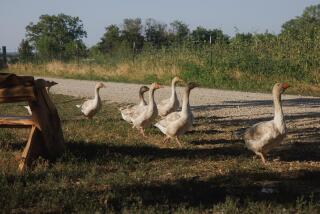A SOAR Spot for the Farmer
- Share via
If the SOAR farmland preservation initiative becomes law, what happens to farmland that is no longer profitable for farming?
Like any other business, whether owned by a large corporation, a family, a partnership or a single farmer, the farm must make a profit to survive.
The average consumer shopping for groceries has little idea of the costs involved in growing food. The farmer pays for water, electricity, frost protection, pest control, fertilizers, farm equipment, fuel and maintenance costs, labor, compensation insurance, liability insurance, fire insurance, loan payments, real and personal property taxes, and bookkeeping costs, just to name a few of the expenses to be paid from the sale of the farmer’s produce. Only if that produce sells at a good price can the farmer hope to have enough money left over to support his family.
*
Let’s compare two businesses, a retail shop and a farm, i.e. a citrus orchard like mine. The two businesses have some factors in common: They both require a large initial investment. The retail store, for example, requires funds for rental, purchase of inventory and interior furnishings, electricity, advertising and full- or part-time help. The farm requires the purchase of land, trees, irrigation, frost protection, tractors and equipment, often accompanied by a large mortgage.
Now suppose the retail store loses customers to a competing business nearby. The owner can no longer cover his expenses, much less make a profit. The businessman may have no choice but to close the business and vacate the premises, perhaps to relocate the business elsewhere. While unfortunate for the proprietor, a vacant store in a strip mall is not a tragedy for anyone else.
However, if the produce market is hit with a glut of foreign citrus, the farmer has to sell his fruit at prices much below his production costs. Now the businessman-farmer can no longer afford to pay for water, fuel, frost protection, and all of the above. So, what is the only thing he can do? Stop farming! And if he has to get out from under taxes and mortgage payments, he may have no other choice but to put his land up for sale.
*
But who is going to buy it, especially if no other use is permitted for the land? No other farmer is going to buy the parcel because he would face the same problem. The bank will probably foreclose on the parcel, but most likely would be unable to find a new buyer. Would a bank even consider lending money on a parcel that cannot be used for anything other than marginal farming?
Unlike the retailer, the farmer cannot easily relocate his business to another neighborhood. Unable to sell his parcel, his finances are now destroyed and a once-green orchard becomes fallow. With dry soil and dead trees, weeds and gopher holes, the farmer’s field is now a source of dust and attracts vermin, vandals and illegal dumping. Most likely the neighbors will file a lawsuit, which will require many months, if not years, of litigation to resolve.
Will the city or county buy the farmer’s land at pre-SOAR prices and convert it into “open space”? Will the city or county subsidize the farmer to continue farming an unprofitable parcel of land? Not very likely!
Are the people who want to preserve farmland the same folks who complain about dust, the use of fertilizers and pesticides, noisy tractors and wind machines and agricultural burning?
It is well known that housing and/or business developments don’t make good neighbors for agricultural parcels. In spite of “right to farm” laws, there will always be complaints if farmers have nonfarm neighbors.
*
A few years ago a subdivision sprang up across the street from my orange orchard. I could not afford to install a fence to enclose the parcel, and soon vandalism, trespassing, trashing and theft became a serious problem. Now, I had not used pesticides on my trees for more than 20 years, fertilizer was simply injected into the irrigation water, and gophers were trapped, not poisoned. However, to save my orchard, I posted two dozen signs with the notice “DANGER: POISON. DO NOT ENTER!”
Although these signs temporarily stopped the problem, the solution backfired when numerous complaints were made and one neighbor advised that she was going to file a lawsuit against me for the “poison” causing her asthma and bad back!
The SOAR initiative is a very bad idea that I hope is found to be unconstitutional. To allow the public to determine land use within a city or county is to allow decisions to be made on emotion and self-interest rather than economics, reason and practicality.
The farmland preservation initiative is inherently (and unfairly) loaded toward its proponents. To vote against farmland preservation, voters will be told, is like voting against “mother, flag, apple pie and the American way of life.”
It is ironic that a law intended to help preserve farmland may instead destroy it.
More to Read
Inside the business of entertainment
The Wide Shot brings you news, analysis and insights on everything from streaming wars to production — and what it all means for the future.
You may occasionally receive promotional content from the Los Angeles Times.










